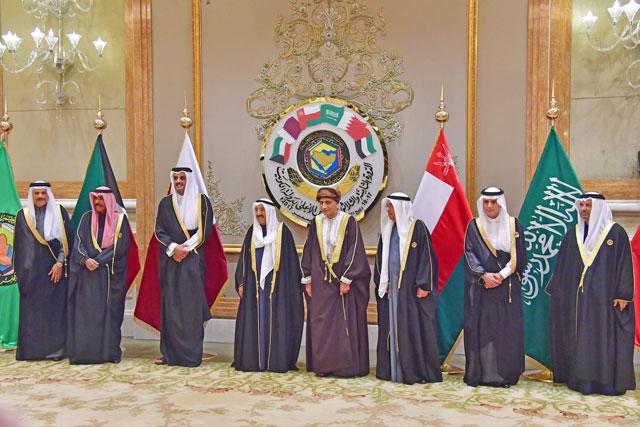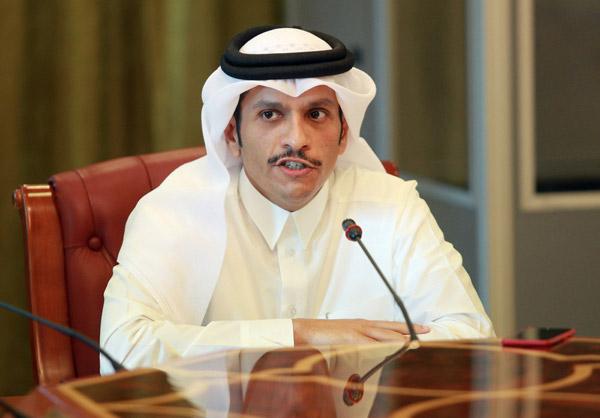You are here
Saudi Arabia, allies snub Qatar at crisis-hit Gulf summit
By AFP - Dec 05,2017 - Last updated at Dec 05,2017

General Secretary of the Gulf Cooperation Council Abdullatif Bin Rashid Al Zayani, Kuwaiti Crown Prince Sheikh Nawaf Al Ahmad Al Sabah, Qatari Emir Sheikh Tamim Bin Hamad Al Thani, Kuwaiti Emir Sheikh Sabah Al Ahmad Al Sabah, Deputy Prime Minister of Oman Fahd Bin Mahmoud Al Said Emir, Bahrain Deputy Foreign Minister Mohammad Bin Mubarak Al Khalifa, Saudi Foreign Minister Adel Al Jubeir and UAE Minister of State for Foreign Affairs Anwar Gargash pose for a family photo at the Gulf Cooperation Council at the Bayan Palace in Kuwait City on Tuesday (AFP photo)
KUWAIT CITY — Regional powerhouse Saudi Arabia snubbed its former ally Qatar at the annual summit Tuesday of Gulf monarchies as King Salman stayed away despite the presence of the Qatari emir.
The crisis-hit Gulf Cooperation Council (GCC) summit was going ahead in Kuwait City despite uncertainty over which leaders from among Riyadh and its allies would in the end join their Qatari rival for the talks.
The future of the six-nation GCC — formed 36 years ago to bring together energy-rich Sunni-led Gulf Arab states — appeared to be hanging in the balance.
This year’s meeting comes with Saudi Arabia and its allies engaged in a bitter dispute with fellow GCC member Qatar, in the worst crisis ever to hit the bloc.
Qatari Emir Sheikh Tamim Bin Hamad Al Thani accepted an invitation to attend, but just hours before the talks were due to begin, Saudi King Salman sent his foreign minister, Adel Al Jubeir, in his stead.
State television showed Kuwaiti Emir Sheikh Sabah Al Ahmad Al Sabah receiving Jubeir at the airport as the head of the kingdom’s delegation.
Bahrain sent its deputy premier and Emirati media said the state minister for foreign affairs would represent Abu Dhabi.
Those three Gulf states, together with Egypt, cut all ties with Qatar on June 5, accusing the gas-rich emirate of supporting extremists and of being too close to Shiite Iran, Riyadh’s archrival.
Qatar denies the allegations and has accused the Saudi-led bloc of aiming to incite a change of regime in Doha.
Kuwait has been leading mediation efforts within the GCC to resolve the crisis, but so far with little success.
Casting further doubt on the group’s future, the UAE said on Tuesday it was forming a new military and economic committee with Saudi Arabia separate from the GCC.
The committee “will coordinate between the two countries in all military, political, economic, trade and cultural fields”, according to a decree issued by UAE President Sheikh Khalifa Bin Zayed Al Nahyan.
Founded in 1981, the GCC is a political and economic union grouping Qatar with Bahrain, Saudi Arabia and the United Arab Emirates as well as Oman and Kuwait.
GCC future in doubt
On Monday, the foreign ministers of Saudi Arabia and Qatar attended round-table talks ahead of the gathering, in their first such encounter since the diplomatic crisis erupted in June.
Omani Minister of State for Foreign Affairs Yussef Bin Alawi sat between them at the meeting which the foreign ministers of the UAE, Bahrain and Kuwait also attended.
After cutting off all ties with Qatar, Saudi Arabia and its allies imposed a land, sea and air blockade of the emirate and issued a list of 13 demands to have it lifted.
Bahrain in October called for Qatar’s membership of the GCC to be suspended until it accepted the demands.
Experts warn that the crisis could lead to the demise of the once-powerful GCC.
“The justifications for the existence of the GCC bloc amidst the continued crisis are no longer present like before,” said Sami Al Faraj, head of the Kuwait Centre for Strategic Studies.
“As long as our enemy has changed from Iran to Qatar, the GCC will not continue.”
The failure of the GCC members to solidify long-delayed plans for economic unity may also threaten its future.
The Gulf states have approved a customs union, a common market, a single currency and a single central bank, but most of these have yet to be implemented.
Speaking at Monday’s meeting, Kuwait’s Foreign Minister Sheikh Sabah Khaled Al Sabah stressed the determination of member states to preserve the GCC.
“The GCC is a continuous project in which the will of member states meets to build a unified Gulf body,” he said.
Related Articles
DUBAI — Kuwait on Thursday invited Qatar to a summit of Gulf countries next week, state media said, the first such invitation in a months-lo
Qatar’s dispute with three fellow Gulf states, which withdrew their envoys from Doha last month, is “over”, the Qatari foreign minister said Wednesday, while insisting his country had made no concessions.
DOHA — Qatar’s foreign minister rejected attempts to interfere in the country’s foreign policy on Thursday, defying calls from the emirate’s
















